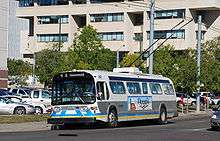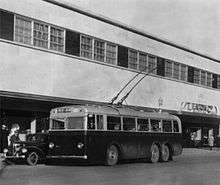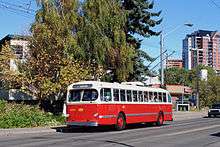Trolley buses in Edmonton
 BBC trolley bus on 97th Street, September 2008. | |
| Operation | |
|---|---|
| Locale | Edmonton, Alberta, Canada |
| Open | September 24, 1939 |
| Close | May 2, 2009 |
| Operator(s) | Edmonton Transit System (ETS) |
| Infrastructure | |
| Electrification | 600 V DC |
| Website | Edmonton Transit System (ETS) |
The Edmonton trolley bus system formed part of the public transport network in Edmonton, Alberta, Canada between 1939 and 2009. Operated by Edmonton Transit System (ETS), the system had, at its peak, a fleet of 137[1][2] trolley buses, and a total route length of 127 km (79 mi).
History

Trolley bus service in Edmonton started on September 24, 1939, operating on route 5 from 101 St/Jasper Ave to 95 St/111 Ave. By the end of October of that year, service had started on another route running to 99 St/Whyte Ave via the Low Level Bridge. In Edmonton, trolley buses were often referred to simply as "trolleys".
The trolley bus system used a mixture of Ohio Brass and K&M Elastic (Swiss) suspension for holding up the overhead wires.
The 49 vehicles remaining in use in 2008 were from an order of 100 manufactured in 1981–82 by Brown Boveri & Company (BBC), using bodies and chassis supplied to BBC by GM.[2] These 100 vehicles for Edmonton were the only trolley buses ever built with the GM "New Look" body, whereas more than 44,000 motor buses were built to that design.[2]
In 2007, a low-floor model of trolley bus was leased from Coast Mountain Bus Company, Vancouver's bus operating company, for a one-year period, for testing of possible benefits of low-floor trolley buses over hybrid diesel buses. During its time in Edmonton the bus was numbered 6000, but its Vancouver number, 2242, was restored when it returned to there.[3]
On June 18, 2008, city council voted 7 to 6 in favour of phasing out the trolley bus system in 2009 and 2010.[2][4] However, city council decided in April 2009 that trolley bus service would be discontinued earlier than originally planned, in order to reduce the city's expected $35 million deficit in 2009.[5] The last day of service was May 2, 2009.[6][7]
Fleet
| Numbers | Built | Withdrawn | Make | Model | Notes |
|---|---|---|---|---|---|
| 101–103 | 1939 | 1951 | Associated Equipment Company (AEC) / English Electric | 663T | |
| 104–109 | 1939 | 1951 | Leyland | 663T | |
| 110–112 | 1942 | 1962 | Mack Truck Co. | CR3S | |
| 113–128 | 1944 | 1965 | Pullman-Standard | No. 116 has been preserved, renumbered 113,[1] by the City of Edmonton. | |
| 129–130 | 1945 | 1965 | American Car and Foundry-Brill | TC44 | |
| 131–192 | 1947–48 | 1978 | Canadian Car and Foundry (CCF)-Brill | T44 | purchased secondhand from Regina Transit in 1966; No. 148 has been preserved by the City of Edmonton. |
| 193–202 | 1952–54 | 1978 | CCF-Brill | T48A | No. 202 (built 1954) has been preserved by the City of Edmonton. |
| 203–212 | 1947 | 1978 | Canadian Car and Foundry (CCF)-Brill | T44 | purchased secondhand from Vancouver in 1962 |
| 213–249 | 1974–76 | 1987 | Flyer Industries | E800 | all sold to Mexico City's STE |
| 100–199 | 1981–82 | 2009 | Brown, Boveri & Cie (BBC) | HR150G | 109 and 110 sold to Dayton, Ohio, in 1994; 103/05–07/16–18/34/41/42/53/54/69/71/76/87/91/96 scrapped in 2005–07; 111/21/24/28/29/31/33/35/38/40/48/52/55/79/83/93/95/98 refurbished in 2004–07; 40 units leased to Toronto Transit Commission from 1989/90 until July 1993 |
| 6000 | 2007 | 2008 | New Flyer | E40LFR | low-floor trolley bus; leased from Coast Mountain Bus Company (Vancouver) for one year in 2007–08, for evaluation |
Depots
- Cromdale Garage - formerly Edmonton Radial Railway trolley bus / streetcar barn; now a bus facility and historic fleet storage.
- Ferrier Garage - formerly trolley bus barn; now a bus facility.
- Mitchell Garage - formerly trolley bus barn; now a bus facility.
- Westwood Garage - formerly trolley bus barn; now a bus facility.
- Strathcona Garage - formerly bus / trolley bus garage (1951–1986); now home to Old Strathcona Farmer's Market and Edmonton Radial Railway Society High Level Bridge Streetcar storage.
Preservation
At least five of Edmonton's 1982 BBC HR150G trolley buses have been preserved by museums or museum-type groups. Those at museums are No. 125, at the Seashore Trolley Museum (in Kennebunkport, Maine, United States); No. 181, at the Illinois Railway Museum (in Union, Illinois, U.S.); and No. 189, at the Trolleybus Museum at Sandtoft (U.K.).[8] No. 132 has been preserved by the Transit Museum Society in Vancouver.[9] In addition, a BBC is expected to be added to the City of Edmonton's collection of historic vehicles, which already includes three vintage trolley buses:[7] Pullman 113 (ex-116) and CCF-Brills 148 and 202. No. 199 has been preserved by the Reynolds Alberta Museum in Wetaskiwin, Alberta. Finally, No. 152 is expected to be preserved for inclusion in the future city transit museum in Sofia, Bulgaria. A group of enthusiasts is currently raising money with a view to purchasing the trolley bus, which is said to be in very good condition, for preservation. As of November 2016 half of the necessary $10.000 have been raised.[10]
See also
- History of Edmonton
- List of trolley bus systems in Canada
- St. Albert Transit
- Strathcona County Transit
References
- 1 2 Hatcher, Colin K. and Tom Schwarzkopf (1983). Edmonton's Electric Transit: The Story of Edmonton's Streetcars and Trolley Buses, pp. 179 and 195. Toronto: Railfare Enterprises Ltd. ISBN 0-919130-33-X.
- 1 2 3 4 Bramley, Rod (July–August 2009). "Edmonton Council Votes to Close System". Trolleybus Magazine No. 286, pp. 74–82. National Trolleybus Association (UK). ISSN 0266-7452.
- ↑ Edmonton Tests new Low Floor Trolley Bus
- ↑ "Trolleys reach end of the line". Edmonton Journal. June 19, 2008. Retrieved October 2, 2009.
- ↑ Landry, Frank (April 16, 2009). "Mayor targets city honchos". Edmonton Sun. Retrieved February 5, 2010.
- ↑ "ETS Trolley Buses". City of Edmonton. Retrieved October 3, 2011.
- 1 2 Trolleybus Magazine No. 286 (July–August 2009), pp. 87 and 89. National Trolleybus Association (UK).
- ↑ Isgar, Carl F. (Jan.-Feb. 2010). "Preservation Update". Trolleybus Magazine No. 289, p. 11.
- ↑ Trolleybus Magazine No. 294 (Nov.-Dec. 2010), pp. 134–136.
- ↑ http://bgtransport.org/?action=news&info=629aeb373e7bd3db0a6ae5f89d77d1c4
External links
![]() Media related to Trolleybuses in Edmonton at Wikimedia Commons
Media related to Trolleybuses in Edmonton at Wikimedia Commons
- "Trolleybus city: Edmonton". Trolleymotion.
- Edmonton database / photo gallery and Edmonton trolleybus list at Urban Electric Transit – in various languages, including English.
